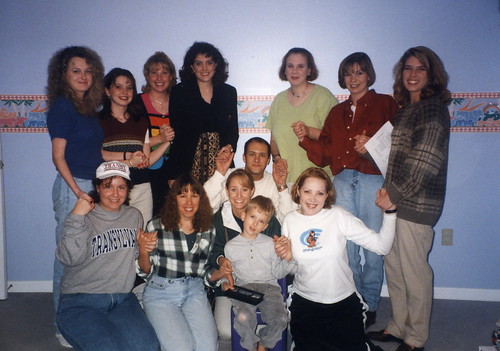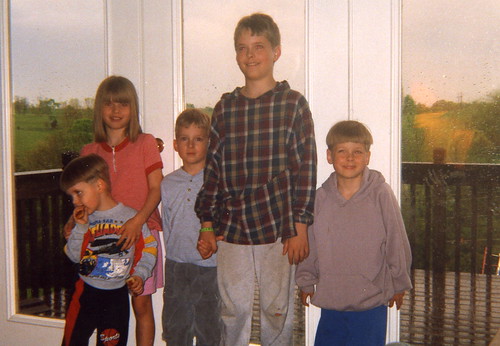I posted a long comment over at Every Waking Hour under the post, “Thinking About Readiness”. Although I published it there, I thought I would post it on my own blog as well.
Willa said:
I’ve read some Piagetian theory in the context of special needs education…. just a very little. One very interesting book that talks a bit about Piaget’s theories is “When Slow is Fast Enough” . It is a thought-provoking book about the flaws in the way Early Intervention programs tend to be set up nowadays. The author Joan Goodman discusses Rousseau, Locke and Piaget in terms of their ideas of child development. She thinks that EI nowadays tends to be Lockean (”filling the vessel” or “writing on the blank slate”) with a thin and slightly hypocritical overlay of Rousseau’s child-centered theories.
And the later conclusion was:
The point of her book is that all the therapy tasks in the world cannot jumpstart or advance a child’s readiness.
Her solution is to create a rich environment both in terms of open-ended resources AND in terms of creative, warm personnel who are willing to play with the child on his or her own terms and be sensitive to the child’s developmental timetable.
As an unschooler type myself, I embrace so much of what is being said about learning in Willa’s post. As it pertains to the plethora of “school-created labels” such as ADD, ADHD, gifted, LD, etc., I think the biggest problem with school is that they blame the child instead of the system that doesn’t account for the child’s learning timeframe nor their learning style. So, that connects huge with what was being said throughout Willa’s post about a rich learning environment, honoring different learning styles, and waiting on each person’s timeframe. In fact, I present a workshop on this very idea called “An Individualized Education: Learning Styles and Time Frames.”
However, I take exception with trying to connect these ideas with more challenged children, such as those with autism (not high functioning or Asperger’s), Down’s Syndrome, mental retardation, etc.. I have first hand experience in this area, and it is very, very different than just providing an unschooling environment. I have several children with autism and one with other pervasive developmental difficulties. If all it takes is the typical learning environment that values and respects the child’s timeframe, there would be no such thing as autism! There are some biologically different brain structures that prevent a child with autism, for instance, from learning from their environment.
The intervention that ended up being my son’s learning style is not about “writing on a clean slate”, but about helping to “rewire the brain” in the areas that were not functioning or did not develop in utero. The brain is an amazingly elastic thing, and it has been shown that it can create new pathways around “disabled parts” or non-existant ones.
I would like to share two examples. Adam had zero imitation skills at 3.5 years old. This is how children learn a LOT, right? Such as speaking, which he was unable to do. (I wonder if learning to walk and eat is a biological response versus an imitative one, by the way.) Well, we worked and worked on retraining the brain to create such a pathway, and when he was tested three years later, it was listed that “imitation is a relative strength”. Pretty exciting, huh? He was also finally able to learn to speak and potty train once he learned even the basics of imitation. It took years, but at about age 9-10, Adam was beginning to learn from his environment naturally, although not to the level of someone without his brain differences. As another interesting side note, social interaction is a more complex imitative skill, so imitative progress has to be made to a more abstract level in order to accomplish this.
William had near zero visual-spatial abilities at 5 years old. He couldn’t even place one block on a piece of paper in the same manner as another person. We worked and worked on blocks and 1.5 years later, after some testing, it stated that he demonstrated a “strength in his visual analytic skills (block design).” It was the only place he did not have a weakness, besides his natural strength in gross motor skills!
To share a different outcome, Alex exhibited the same type of difficulties as his brother Adam. He was diagnosed with autism at two years old. For three months, I had the EI people in our home six hours a week of one on one for speech, occupational therapy and play therapy. It was all very child-led learning . . . joining in with him, etc. He learned nothing in that three months except bye-bye. I started the intervention that worked so well for his brother with him, and within the next three months, he had accumulated about 50 words, some imitative skills, and playing some games and songs. After another four years of consistently and actively helping him learn in the way that made sense to him, his brain was able to do whatever it does, and the floodgates were thrown open.
Alex had strengths in areas his brother did not that helped this transformation occur when it did not for his sibling. We were then able to help him delve deeper into the social arena, abstract reasoning, etc. Alex would be considered a person living with high functioning autism now.
If difficulty with learning is about being slower, or learning differently, then all that was said in the book cited by Willia would apply! If learning is about something serious missing in your brain functioning, then it is about something else. One extra copy of a chromosome causes serious differences in learning for those with Down Syndrome. Lacking imitative skills causes serious differences in learning for those with autism (that’s just one of many differences that combines to make living with autism difficult). It’s not about waiting, but helping them learn in a different way. It’s not going to change if you wait.
Definitely all my opinion, from my experience . . .
The top picture are the people who all lovingly worked with Adam to bring him his smile the first two years after his diagnosis of autism.
The middle picture are the people who all lovingly worked with Alex to bring him his social outlet the first year after his diagnosis of autism.
The bottom picture are all the children after the party I held to thank everyone for all that they did for the two youngest before we moved away to another state in 1998.

Adam’s Circle of Love

Alex’s Circle of Love

The Children, May 1998

Pingback: everywakinghour » Special Needs
Pingback: Apple Stars » Blog Archive » Learning Differences